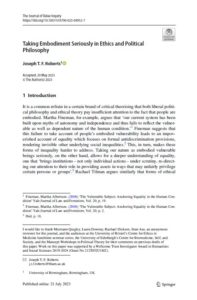This post summarises a recent paper by Joseph T F Roberts – Taking Embodiment Seriously in Ethics and Political Philosophy – recently published in The Journal of Value Inquiry.
The idea that we ought to take account of how people are embodied has become commonplace amongst a heterogeneous groups of philosophers and critical theorists. These include feminist scholars, communitarian political philosophers, phenomenologists, disability scholars, Foucauldian theorists, and care ethicists. Taking liberalism (and the disembodied view of the self it is said to presuppose) as their target, they argue that standard approached to ethical theorising pay insufficient regard to how the bodies we have influence our lives.
In this paper I consider the thesis that political philosophy and ethical theorising needs to consider how people are embodied, aiming to provide an account of why we ought to take people’s embodiment seriously, and what doing so looks like. The paper argues that, contrary to what is often claimed, standard approaches to ethical theorising and political philosophy can, in fact, take people’s embodiment seriously in a number of ways. The paper shows that how we are embodied matters if we care about autonomy, harm prevention, and fairness.
- With regards to autonomy, I argue that what our bodies are like influences how well (and in what ways) we can exercise our autonomy. Inquiring into how people experience their embodiment is, thus, important because it can reveal ways in which autonomy is impaired or frustrated which might otherwise be overlooked.
- With regards to harm, I argue that, as many harms are partly experiential, if we want to understand the character and magnitude of the harms people are experiencing, we need to inquire into people’s first-person perspectives on their embodiment.
- With regards to fairness, I argue that what our bodies are like is a crucial factor in determining both what counts as a fair share of the benefits and burdens of a cooperative enterprise. If we care about fairness, we need to inquire into how people are embodied.
The paper then goes on to consider the view that taking embodiment seriously requires adopting a particularist meta-ethics, i.e. eschewing the use of principles in moral reasoning. Although it is true that poorly formulated principles may be bad ethical guides and obscure important contextual features, I argued that if principles are appropriately hedged, they can be both suitably general and sensitive to contextual factors. As a consequence, taking embodiment seriously needn’t require a wholesale rejection of liberal approaches to justice in favour of an ethics of care or vulnerability approach.
In the final section of the paper, I argue that instead of conceiving of the ethics of care and vulnerability approaches as complete alternatives to liberal approaches to ethics, we ought to see them instead as complements to each other. This, I suggest, is good news for those who want to take embodiment seriously, as if they were opposites one would be forced to choose between them. Seeing them as compliments, on the other hand, allows us to give the give the best, most coherent, justification for each of the institutions and policies of the welfare state, with some policies being justified by the values of autonomy, harm, and fairness; and others justified by the value of care.
Want to know more?
Read the full chapter here, or by clicking on the image (right)

